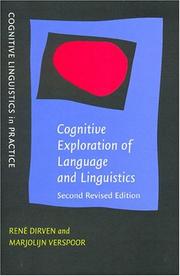| Listing 1 - 10 of 25 | << page >> |
Sort by
|

ISBN: 9027225664 155619661X 9781556196614 9789027225665 9789027297976 9027297975 1282162314 9781282162310 9786612162312 6612162317 Year: 2000 Publisher: Amsterdam Benjamins
Abstract | Keywords | Export | Availability | Bookmark
 Loading...
Loading...Choose an application
- Reference Manager
- EndNote
- RefWorks (Direct export to RefWorks)
This title presents an introductory 10-week course for students of English language and linguistics. It aims to give students proficiency in English analysis at sentence, clause and phrase level and have an understanding of the traditional terms and concepts of English syntax.
English language --- Grammar --- Sentences. --- Syntax. --- 802.0-07 --- #KVHA:Linguistiek; Engels --- #KVHA:Taalkunde; Engels --- 81'367 --- Engels --- spraakkunst (grammatica) --- zinsontleding --- 802.0-07 Engels: taalonderwijs; taalverwerving --- Engels: taalonderwijs; taalverwerving --- Contains audio-visual material --- Anglais (Langue) --- Sentences --- Syntax --- Phrase --- Syntaxe --- Germanic languages --- English language - Sentences. --- English language - Syntax.

ISBN: 9027236542 1556198655 9786613047113 9027285594 128304711X 9789027236548 9781556198656 Year: 1997 Volume: 150 Publisher: Amsterdam : Benjamins,
Abstract | Keywords | Export | Availability | Bookmark
 Loading...
Loading...Choose an application
- Reference Manager
- EndNote
- RefWorks (Direct export to RefWorks)
Grammar, Comparative and general --- Semantics --- Syntax --- Congresses. --- Lexicology. Semantics --- Grammar
Book
Year: 1990
Abstract | Keywords | Export | Availability | Bookmark
 Loading...
Loading...Choose an application
- Reference Manager
- EndNote
- RefWorks (Direct export to RefWorks)

ISSN: 03040763 ISBN: 1556199775 9027237069 9786613174635 1283174634 9027283753 9789027237064 9781556199776 9789027283757 9781283174633 6613174637 Year: 2000 Volume: 199 Publisher: Amsterdam Benjamins
Abstract | Keywords | Export | Availability | Bookmark
 Loading...
Loading...Choose an application
- Reference Manager
- EndNote
- RefWorks (Direct export to RefWorks)
About a century after the year Benjamin Lee Whorf (1897-1941) was born, his theory complex is still the object of keen interest to linguists. Rencently, scholars have argued that it was not his theory complex itself, but an over-simplified, reduced section taken out of context that has become known as the Sapir-Whorf hypothesis that has met with so much resistance among linguists over the last few decades. Not only did Whorf present his views much more subtly than most people would believe, but he also dealt with a great number of other issues in his work. Taking Whorf's own notion of linguistic relativity as a starting point, this volume explores the relation between language, mind and experience through its historical development, Whorf's own writing, its misinterpretations, various theoretical and methodological issues and a closer look at a few specific issues in his work.
Sapir-Whorf hypothesis --- Language and culture --- Thought and thinking --- Sapir-Whorf, Hypothèse de --- Langage et culture --- Pensée --- Congresses --- Congrès --- Language and culture. --- Thought and thinking. --- Sapir-Whorf hypothesis. --- Psycholinguistics --- Sociolinguistics --- Sapir-Whorf, Hypothèse de --- Pensée --- Congrès --- Culture --- Anthropological linguistics
Dissertation
Year: 1990 Publisher: Leiden : s.n.,
Abstract | Keywords | Export | Availability | Bookmark
 Loading...
Loading...Choose an application
- Reference Manager
- EndNote
- RefWorks (Direct export to RefWorks)
Dissertation
Year: 1990 Publisher: S.l. s.n.
Abstract | Keywords | Export | Availability | Bookmark
 Loading...
Loading...Choose an application
- Reference Manager
- EndNote
- RefWorks (Direct export to RefWorks)
Book
ISBN: 9789083173283 Year: 2023 Publisher: Uitgeverij Abessijn
Abstract | Keywords | Export | Availability | Bookmark
 Loading...
Loading...Choose an application
- Reference Manager
- EndNote
- RefWorks (Direct export to RefWorks)
?Hoe gaat het met je?? Een goedbedoelde vraag die vaak gesteld wordt. K en M proberen er meestal met een kwinkslag onderuit te komen. Ze kunnen die vraag niet zomaar beantwoorden, want K heeft de ziekte van Parkinson (dzvP). ?Naar omstandigheden wel goed? is eigenlijk het meest passende antwoord. In hun speurtocht door Parkinsonland komen K en M regelmatig onverwachte dingen tegen, bij elkaar en ook bij zichzelf. Meer zorg toelaten en daar oprecht dankbaar voor zijn, is voor K een grote stap. Maar toenemende afhankelijkheid vergt moed van beide kanten. Waar de één een deel van zijn eigenwaarde inlevert, krijgt de ander er nogal wat verantwoordelijkheid bij.K en M geven in dit boek een inkijk in het dagelijks leven van een Parkinsonpatiënt en zijn partner. Het is geen roman of persoonlijk dagboek, maar het laat zien hoe gewone dingen voor iemand met dzvP helemaal niet zo gewoon zijn. Voor u, geachte lezer, kan dit boek troostend, verhelderend en, waar nodig, confronterend zijn. Leven met dzvP is als lopen langs de rand van een afgrond. Het lukt, maar je bent nooit helemaal ontspannen. K en M maken de tocht samen en met respect voor elkaar, ook al heeft de één soms een kort lontje en reageert de ander dan ook weer onnodig scherp en moeten er wat herstelwerkzaamheden uitgevoerd worden. Ze komen er altijd weer uit, liefst met humor, en steeds gebaseerd op wederzijds vertrouwen en affectie. Want, zoals de Groningse neuroloog Teus van Laar zegt: ?DzvP heb je samen.?https://uitgeverijabessijn.nl/boeken/ik-beef-dus-ik-leef/
Book
ISBN: 9027219028 9789027219022 Year: 1998 Volume: 1 Publisher: Amsterdam Benjamins
Abstract | Keywords | Export | Availability | Bookmark
 Loading...
Loading...Choose an application
- Reference Manager
- EndNote
- RefWorks (Direct export to RefWorks)

ISBN: 2801113131 9782801113134 Year: 2002 Volume: *9 Publisher: Bruxelles De Boeck-Duculot
Abstract | Keywords | Export | Availability | Bookmark
 Loading...
Loading...Choose an application
- Reference Manager
- EndNote
- RefWorks (Direct export to RefWorks)
Psycholinguistics --- Linguistics --- Cognition --- Academic collection --- Linguistic science --- Science of language --- Language and languages --- Psychology --- Cognition. --- Linguistics.

ISBN: 9027219060 9027219052 1588114856 9786612160394 1282160397 9027295417 9789027219060 9789027295415 9781588114853 1588114864 9781588114860 9789027219053 Year: 2004 Volume: 1 Publisher: Amsterdam Benjamins
Abstract | Keywords | Export | Availability | Bookmark
 Loading...
Loading...Choose an application
- Reference Manager
- EndNote
- RefWorks (Direct export to RefWorks)
Cognitive Exploration of Language and Linguistics is designed as a comprehensive introductory text for first and second-year university students of language and linguistics. It provides a chapter on each of the more established areas in linguistics such as lexicology, morphology, syntax, phonetics and phonology, historical linguistics, and language typology and on some of the newer areas such as cross-cultural semantics, pragmatics, text linguistics and contrastive linguistics.In each of these areas language is explored as part of a cognitive system comprising perception, emotion, categorisation, abstraction processes, and reasoning. All these cognitive abilities may interact with language and be influenced by language. Thus the study of language in a sense becomes the study of the way we express and exchange ideas and thoughts.This Second Revised Edition is corrected, updated and expanded.Cognitive Exploration of Language and Linguistics is clearly presented and organized after having been tested in several courses in various countries.Includes exercises (solutions to be found on the Internet).
Psycholinguistics --- Linguistics --- Cognition --- 800 --- #KVHA:Linguistiek --- #KVHA:Cognitieve linguistiek --- Taalwetenschap. Taalkunde. Linguistiek --- 800 Taalwetenschap. Taalkunde. Linguistiek --- Cognitie --- Langage [Sciences du ] --- Langage [théorie du ] --- Linguistic science --- Linguistique --- Linguïstiek --- Science of language --- Sciences du langage --- Taalkunde --- Taalwetenschap --- Théories du langage --- Philology & Linguistics --- Languages & Literatures --- Psychology --- Language and languages --- Linguistics. --- Cognition.
| Listing 1 - 10 of 25 | << page >> |
Sort by
|

 Search
Search Feedback
Feedback About UniCat
About UniCat  Help
Help News
News